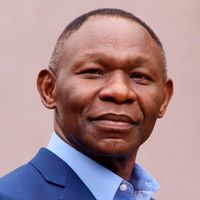
One of the specific objectives of Africa’s digital transformation strategy is to create a harmonised environment necessary to guarantee investment and financing. PHOTO | SHUTTERSTOCK
Summary
- One of the specific objectives of Africa’s digital transformation strategy is to create a harmonised environment necessary to guarantee investment and financing.
- The strategy has a target for an additional 300 million people in Africa coming online by 2025.
- The measure of progress towards meeting AU and Smart Africa objectives is the ICT readiness (access to ICT infrastructure), skilling and reskilling the workforce, cybersecurity resilience, and use of ICTs.
An article by Dr Vera Songwe, Under-Secretary General of the United Nations and Executive Secretary of the United Nations Economic Commission for Africa (UNCEA) in 2020, clearly brought out the importance of digital transformation in Africa. She emphasised that digitalisation was one of the most powerful tools for implementing the 2030 Agenda for Sustainable Development and Africa’s Agenda 2063.
The African Union (AU) during a summit in 2019 came up with a digital transformation strategy whose overall objective is “to harness digital technologies and innovation to transform African societies and economies”.
The summit discussed how to transform Africa into a knowledge economy by leveraging on emerging technologies. Ultimately, they want a situation where member states are able to become more competitive on a global scale by increasing innovation and boosting job opportunities and improvements in sectors such as health care, education and agriculture.
But the big question that everyone is still asking: Can digital transformation be realised in Africa? In an interview by the World Bank in January 2021, Dr Amani Abou-Zeid, the AU Commissioner for Infrastructure and Energy, agrees that Africa is facing various challenges in the implementation of the digital transformation. These include the strengthening of the coordination framework, aligning policies and sector regulation and scaling-up of investment and dedication of resources.
According to her, to address these challenges, the AU Commission in collaboration with other continental institutions and regional economic communities are already working with member states to identify and address barriers to harmonise laws and regulations and drive leadership for necessary reforms that ensure future investment in digital transformation.
And one of the specific objectives of Africa’s digital transformation strategy is to create a harmonised environment necessary to guarantee investment and financing in order to close the digital infrastructure gap and achieve an accessible, affordable and to secure broadband, across demography, gender, and geography. The strategy has a target for an additional 300 million people in Africa coming online by 2025.
It is expected that each member state will cascade the continental agenda nationally. The measure of progress towards meeting AU and Smart Africa objectives is the ICT readiness (access to ICT infrastructure), skilling and reskilling the workforce, cybersecurity resilience, and use of ICTs. This is because all of these factors have got the potential of contributing to greater productivity and subsequent economic transformation in Africa.
But on the ground, virtually every country is doing the opposite. Some countries have arbitrarily shut down Internet to especially limit the use of social media at the slightest provocation. Others cleverly limit the use of ICTs by heavily taxing broadband and devices or through religious or outdated cultural practices of keeping women busy with household chores.
Either way a good number of our population are kept out of the productive sectors of the economy. And considering that emerging technologies are fostering innovations, we see the ecosystem resisting them even before we understand the kind of innovations that will emerge.
In Kenya, for example, shylocks have terrorised citizens for delays in payment of borrowed funds. We are seeing Artificial Intelligence powering the lending without ever seeing the borrower and without any collateral. But the Treasury is still seeking to regulate mobile lenders. It should be in the interest of any State that its citizens must become more financially disciplined and be part of the formal economy.
We all acknowledge that digitalisation of public services has improved efficiency and productivity of the government and the citizens respectfully. But all these should serve as a wake-up call on the importance to intensify digitalisation in all sectors of the economy.





No comments :
Post a Comment